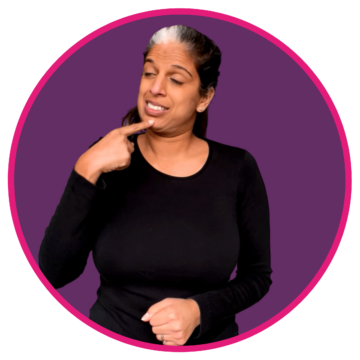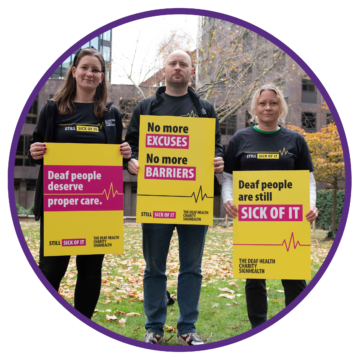
FAQs
What do you want to know about SignHealth?
SignHealth FAQs answer some of the questions we get asked the most.
Have a different question? Please contact one of our service teams or use our online contact form.
SignHealth provides self-care and mental health awareness workshops delivered in British Sign Language anywhere in England. To book a workshop at your local deaf club or for a community group please contact communications@signhealth.org.uk.
SignHealth’s domestic abuse service provides workshops in schools, training for social work professionals working with deaf clients, and healthy relationship workshops for deaf people.
Does SignHealth offer deaf awareness or sign language courses?
SignHealth does not currently offer Deaf Awareness Training or BSL courses, though we do strongly encourage it! Here is a list of excellent organisations that can help you find the right training for your team delivered by deaf trainers online or in person.
- Signature
- WealdBSL
- Greater Manchester Mental Health
- RNID
- National Deaf Children’s Society
- Or worth asking your local deaf club or colleges
Does SignHealth offer accessible training for deaf supported living professionals?
SignHealth does have some training modules for deaf staff in care settings. If interested, please contact Paul Scott at pscott@signhealth.org.uk to learn more.
Does SignHealth offer support groups for deaf carers?
No but this is a great idea! Please let us know if you find one so that we can help promote the group to others, email communications@signhealth.org.uk.

All NHS Trusts in the UK have contracted language service providers. If you work in an NHS Trust or deliver services on their behalf, contact your NHS Trust Interpreting Team to request the appropriate communication support (BSL interpreters, lip-speakers, deafblind communicators, etc.).
SignHealth does not provide BSL interpreters or translators. We suggest searching the NRCPD register for an interpreter in your area if you need someone to simultaneously interpret English/BSL in a meeting, appointment, event, etc. Or search for a BSL interpreting agency in your area.
The NRCPD register also has a list of Sign Language Translators, who are qualified to translate written English into a BSL video, such as a script, leaflet, letter, etc. There are also a number of companies who specialise in translation projects and can advise on the process and manage the project from start to finish, just search online for ‘British Sign Language Translation Services’.
Please recognise that sign language interpreters and translators are highly skilled roles that provide necessary access to services and information for deaf people. You must ensure that all health appointments or information translations are carried out by a professional who is registered with the NRCPD.
SignHealth is a national charity, but since 2020 we have become a remote organisation with no head office space. This means all of our staff either work from home, in a residential service or in the community.
Our postal address is: SignHealth, Canopi, 82 Tanner Street, London SE1 3GN
Read more about our residential services
SignHealth’s therapy service is delivered primarily through video calls, so we are able to support deaf people living anywhere in England and Wales.
Our Domestic Abuse Service is currently in the process of expanding nationally. Please contact our team and we will do our best to support clients anywhere in England.
SignHealth staff, who are not part of a social care team, generally work from home and tend to meet regularly with their teams at locations in Manchester, London and Birmingham. This means there is a lot of flexibility in our recruitment, you can work for SignHealth from anywhere in the UK!
It is the responsibility of your GP or any NHS service to give you an option to contact the service in an accessible way. According to the Accessible Information Standard (AIS), only providing a phone number to a deaf patient is not acceptable.
- Try checking their website to see if they provide alternative contact options
- Many GP surgeries have an online contact form
- If you have an urgent medical issue you can contact NHS 111, either the online form or through the NHS 111 – British Sign Language Service
- Contact your local Patient Advice and Liaison Service (PALS)
- Contact your local HealthWatch or in a BSL Video Call
Once you make contact with your GP, hospital or clinic, ask for your patient file to be updated to include the information:
- That you are deaf
- Your communication preferences (such as a BSL interpreter present at appointments)
- How you prefer to be contacted (email, text, letter, etc.).
- Then ask for the details for how you can contact their service in the future.
If you can, please take the time to make a complaint. If a formal complaint is not logged in their system, many services will not understand the need for change. It is an unfair burden on your time but together we can work towards a future with no barriers.
Please check our BSL Health Video Library or search for the word in the search box on the top right of our website.
Your GP or clinic must provide you with information in an accessible format. Find out more about your rights to accessible information from the NHS.
The communications team at SignHealth are also happy to partner with other charities or the NHS to help produce more health information videos in BSL. To explore this option please contact us at communications@signhealth.org.uk
I need mental health support
Have you explained how you’re feeling to your GP? That’s the best place to start.
There are self-help video guides on our website for many common mental health , including anxiety, depression, anger, sleep issues, grief, eating disorders and more. Take some time to search the BSL Health Library for resources that might help you learn more about mental health conditions and tips for taking care of yourself.
If you want therapy from SignHealth, please use our self-referral form. Here’s a short how-to guide explaining how to complete it.
Does SignHealth offer counselling sessions?
Our team can in some cases provide certain types of counselling, but funding from the NHS is approved through the old Individual Funding Requests (IFR) route. Please use the referral form for therapy and add that you are interested in counselling. Your needs will be assessed through the referral process and we can identify the treatment that is best for you.
I am looking for mental health support for a deaf family member
We encourage the deaf person to make contact with their GP or to self-refer to our therapy service. See our How-To-Guide. Here is the online self-refer form. Then check out our blog (BSL/English) about concern for the mental health of family members.
How do I refer my patient or client for therapy with SignHealth?
Use our online form to refer a patient or client to NHS Therapies with SignHealth. We are the only NHS therapy service for deaf people with anxiety and depression.
SignHealth delivers NHS therapies for Deaf people. There are trainee routes into this service to become high-intensity cognitive behavioural therapists and psychological wellbeing practitioners. These are fully funded employment routes. Follow us on social media and check out the Work For Us page on the SignHealth website.
To train as a counsellor, we suggest contacting course providers in your area and enquire about accessibility through DSA funding to cover fees for interpreters at lectures/ note takers and translators for your video recordings to be marked by course staff. You will often need to pay for this training yourself depending on your personal circumstances. These courses require placements to gain experience and SignHealth can sometimes offer workplace experience in the generic counselling side of our service.
Referrals to our residential services or outreach teams come directly from the local council.
SignHealth outreach teams serve London, Hertfordshire, High Wycombe, Reading, Manchester, Birmingham and West Yorkshire. If you would benefit from support in BSL, or have a family member who you want to be referred to support from SignHealth, visit www.gov.uk/apply-needs-assessment-social-services .
If you would like to pay privately or through Direct Payments, you can contact the outreach team that serves your area.
The first step is always to ask your Deaf colleague about their access needs and how you can adjust your practices to support communication. Everyone has their own preferences, so it’s good to be open and ask them directly and not to make assumptions.
You may want to consider Deaf Awareness Training for your team in recognition that inclusion requires learning and action from everyone.
RNID (formerly known as Action on Hearing Loss) have an excellent guide for employers.
SignHealth partners with a small number of academic research projects in order to better understand deaf people’s health and access barriers and we strongly encourage more study of topics related to this field, however we are unable to support with requests for deaf participants or survey responses. We suggest sharing on Facebook groups or connecting with your local Deaf club.
SignHealth very rarely offers internships and these are all advertised in the Jobs section of our website. We do hope that you will use the information from our studies to support your research, you can find these in our resources page.
If you are interested in conducting a larger study linked to Deaf people’s health and wellbeing in the UK, please contact communications@signhealth.org.uk.







